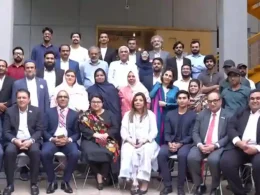The Pakistan Telecommunication Authority (PTA) has proposed a comprehensive regulatory framework requiring all Over-The-Top (OTT) services, including major platforms like YouTube, Netflix, WhatsApp, Facebook, and X (Twitter), to register locally for a period of 15 years. This move, outlined in a detailed 14-page draft available on the PTA’s website, is aimed at tightening the regulatory oversight of digital services operating in Pakistan.
The draft framework stipulates that OTT Communication Services must obtain a 15-year license from the PTA. Malahat Obaid, the spokesperson for PTA, stated in an interview with Geo Fact Check that the draft has been published to gather feedback from stakeholders, with a deadline for public comments set for July 10. “PTA will analyze the responses and decide accordingly,” Obaid added.
According to the draft, the PTA categorizes OTT services into three groups: Communication Services (e.g., Viber, Skype, WhatsApp), Application Services (e.g., Facebook, Twitter, Instagram), and Non-Broadcasting Media Services (e.g., YouTube, Netflix, Spotify). These services would need to comply with the new authorization framework within 12 months. Post this period, any service operating without PTA authorization would be considered illegal.
The proposal cites the controversial Removal and Blocking of Unlawful Online Content Rules 2021, emphasizing the necessity for OTT services to register locally. However, it has faced criticism for its potential to infringe on digital freedoms. In May 2022, the Islamabad High Court directed the government to review the 2021 Rules to ensure they align with constitutional rights, but no revisions have been made to date.
Additionally, the new framework mandates that “personal data” must be stored exclusively within Pakistan, with content monitoring and evaluation overseen by relevant government ministries and organizations. Concerns about the implications of such regulations for data privacy and security remain unanswered, as the PTA spokesperson did not provide a response before this report was filed.
Digital rights activists argue that this move by the PTA reflects a desire for increased control over online content. Farieha Aziz, co-founder of Bolo Bhi, an advocacy forum for digital rights, pointed out that the PTA has previously attempted similar regulations in 2020. “This is not new. They have tried this earlier as well,” Aziz remarked. “They [PTA] want as much control over online content as they can get.”
In 2020, Usama Khilji, director of Bolo Bhi, criticized such regulations in an opinion piece for Dawn, highlighting potential impacts on freedom of speech and press freedoms. He warned that these requirements could force international OTT companies to exit the country rather than invest further. The 2020 proposed regulation was eventually rejected by the Senate Functional Committee on Human Rights.
Khilji told Geo Fact Check that the recently proposed framework shares similar intentions of localizing the online data of Pakistani users. Currently, OTT companies store data in servers located abroad, in countries like Singapore or the United States, where significant investments are made to ensure data security and encryption. “But PTA wants social media companies to store their data in Pakistan,” Khilji explained. “So that whenever the government asks for [a private citizen’s] data, these companies will have to provide access.”
As the deadline for public feedback approaches, the PTA’s proposal continues to spark debate over the balance between regulatory oversight and the preservation of digital rights in Pakistan. The outcome of this initiative could significantly reshape the digital landscape and the operations of OTT services in the country.










